Venturing into the world of travel insurance can be daunting, especially for first-timers. With a plethora of options and intricate details, it’s easy to feel overwhelmed. Fear not, intrepid traveler! This comprehensive guide will equip you with the knowledge and strategies to make informed decisions about travel insurance, ensuring a stress-free and protected journey.
From deciphering insurance jargon to selecting the right coverage, we’ll delve into the intricacies of travel insurance. We’ll explore the factors that influence travel risks, common exclusions and limitations, and the importance of understanding your policy. We’ll also provide practical tips for filing claims, managing emergencies, and ensuring peace of mind throughout your travels.
Comprehending Insurance Terminology
Travel insurance policies are packed with specific terms and phrases that can be confusing to the uninitiated. Understanding these terms is crucial for making informed decisions and ensuring you have the right coverage for your trip.
Let’s explore some key terms and their relevance in travel insurance:
Policy Coverage
- Coverage Limits: The maximum amount the insurance company will pay for a covered claim.
- Deductible: The amount you pay out-of-pocket before the insurance company starts to cover expenses.
- Covered Expenses: Specific expenses that are covered by the policy, such as medical expenses, trip cancellation, and lost baggage.
Trip Interruption
- Trip Delay: Coverage for expenses incurred due to a delay in your trip, such as hotel accommodation and meals.
- Trip Cancellation: Coverage for non-refundable expenses if you have to cancel your trip due to a covered reason.
Baggage Coverage
- Baggage Loss or Damage: Coverage for the value of your luggage and personal belongings if they are lost, damaged, or stolen.
- Baggage Delay: Coverage for essential purchases if your luggage is delayed.
Medical Coverage
- Emergency Medical Expenses: Coverage for medical expenses incurred during your trip, including hospitalization, doctor visits, and medication.
- Medical Evacuation: Coverage for transportation to a medical facility in case of an emergency.
Understanding these terms is essential because:
- It helps you understand the scope of coverage provided by your policy.
- It enables you to make informed decisions about the level of coverage you need.
- It ensures you can communicate effectively with your insurance provider in case of a claim.
Types of Travel Insurance Coverage
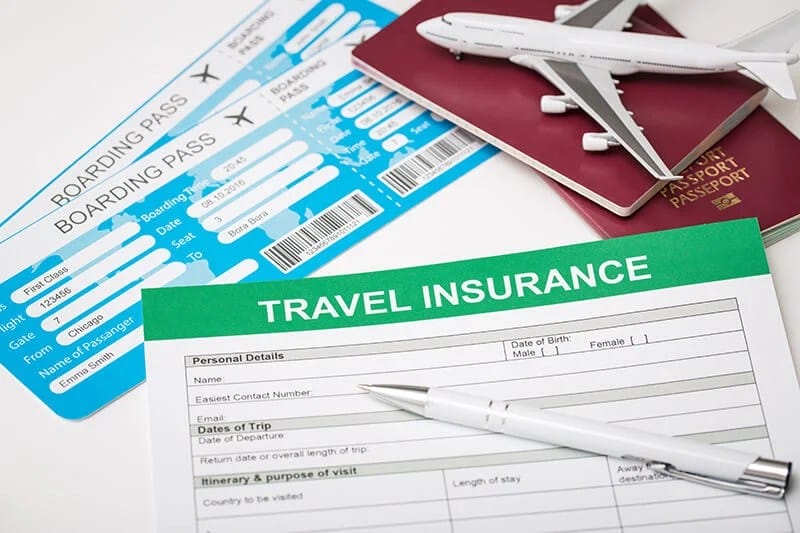
Travel insurance provides a safety net during unexpected events that can disrupt or ruin your trip. Understanding the various types of coverage available can help you make informed decisions about the right policy for your needs.
Travel insurance policies typically cover a range of potential risks, including:
Trip Cancellation and Interruption
This coverage reimburses you for prepaid, non-refundable trip expenses if you’re forced to cancel or interrupt your trip due to covered reasons, such as illness, injury, or natural disasters.
Medical and Emergency Expenses
This coverage provides reimbursement for medical expenses incurred during your trip, including hospitalization, doctor visits, and prescription medications. It may also cover emergency medical evacuation and repatriation if necessary.
Baggage and Personal Belongings
This coverage protects your luggage and personal belongings against loss, theft, or damage while traveling. It may also cover items purchased during your trip.
Trip Delay
This coverage reimburses you for additional expenses incurred due to a covered delay, such as meals, accommodation, and transportation.
Rental Car Damage
This coverage provides protection against damage to a rental car during your trip, subject to the terms and conditions of the rental agreement.
Missed Connection
This coverage reimburses you for expenses incurred if you miss a connecting flight or transportation due to a covered reason.
Accidental Death and Dismemberment
This coverage provides a lump sum benefit to your beneficiaries in the event of your accidental death or dismemberment during your trip.
Tips for Selecting the Right Coverage
- Consider your destination and the activities you’ll be participating in.
- Review the terms and conditions of your travel insurance policy carefully.
- Consider purchasing additional coverage for high-value items or activities.
- Make sure your policy covers any pre-existing medical conditions.
- Consider the duration of your trip and choose a policy that provides adequate coverage.
Assessing Travel Risks
When planning an international trip, it’s crucial to assess the potential risks associated with your destination. This comprehensive evaluation will help you determine the appropriate level of travel insurance coverage and ensure a safe and enjoyable journey.
To conduct a thorough risk assessment, consider the following factors:
Political and Social Stability
- Research the political climate, recent events, and any potential for civil unrest or terrorism in your destination.
- Evaluate the country’s human rights record, LGBTQ+ rights, and the safety of journalists and activists.
- Assess the level of crime, including petty theft, violent crime, and organized crime.
Natural Disasters and Health Risks
- Investigate the region’s history of natural disasters such as earthquakes, hurricanes, floods, and volcanic eruptions.
- Check the Centers for Disease Control and Prevention (CDC) website for travel health recommendations, including required vaccinations and precautions against diseases like malaria, dengue fever, and yellow fever.
- Consider the availability and quality of healthcare services in your destination.
Infrastructure and Transportation
- Evaluate the condition of roads, bridges, and public transportation systems.
- Research the safety record of airlines, trains, and buses in the country.
- Consider the availability of reliable communication networks and emergency services.
Once you have gathered information about these factors, prioritize the risks based on their likelihood and severity. This will help you determine the appropriate level of insurance coverage and any additional precautions you may need to take.
Understanding Exclusions and Limitations
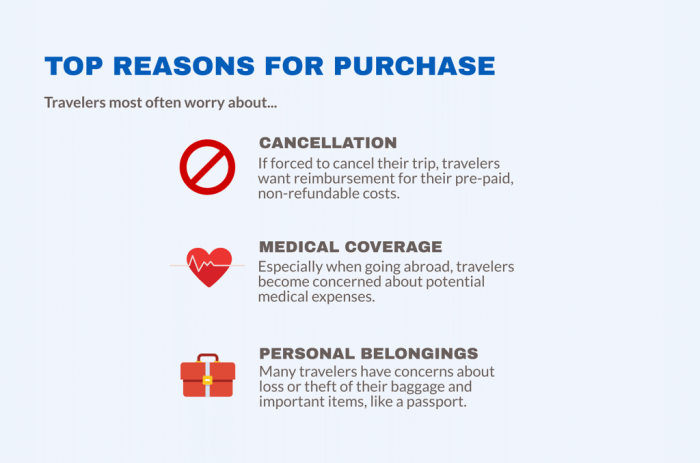
Travel insurance policies, while comprehensive, do have certain exclusions and limitations that define the scope of coverage. It’s crucial to be aware of these limitations to avoid surprises during a claim and ensure you have adequate protection.
Common Exclusions in Travel Insurance
- Pre-existing Medical Conditions: Typically, travel insurance doesn’t cover pre-existing medical conditions, unless they are specifically declared and covered by a rider.
- Extreme Sports and Activities: High-risk activities like skydiving, bungee jumping, and scuba diving are often excluded or require additional coverage.
- Illegal Activities: Travel insurance doesn’t cover losses or expenses resulting from illegal activities or participation in criminal acts.
- Natural Disasters: Some policies may exclude coverage for losses due to natural disasters like earthquakes, hurricanes, or floods, unless specified otherwise.
- War and Terrorism: Coverage for losses related to war, terrorism, or civil unrest may be limited or excluded.
Tips for Avoiding Surprises and Ensuring Adequate Coverage
- Read the Policy Carefully: Before purchasing a travel insurance policy, thoroughly read and understand the terms, conditions, exclusions, and limitations.
- Declare Pre-existing Conditions: If you have pre-existing medical conditions, disclose them to the insurance provider to determine coverage options.
- Consider Optional Coverage: If you plan to engage in high-risk activities or visit areas prone to natural disasters, consider purchasing additional coverage.
- Review Coverage Limits: Pay attention to coverage limits for different types of losses, such as medical expenses, trip cancellation, and baggage loss.
- Contact Your Insurance Provider: If you have questions or concerns about coverage, don’t hesitate to contact your insurance provider for clarification.
Choosing a Travel Insurance Provider
Selecting the right travel insurance provider is crucial for ensuring a seamless and stress-free travel experience. Consider these key factors when making your choice:
Coverage: Review the coverage options offered by different providers to ensure they align with your specific travel needs and destinations. Consider factors like medical coverage, trip cancellation, baggage loss, and emergency assistance.
Reputation and Customer Service
Read online reviews, testimonials, and ratings from previous customers to gauge the reputation and customer service of different travel insurance providers. Look for companies with a track record of prompt claims processing, helpful customer support, and positive feedback.
Price Comparison
Compare the premiums offered by different providers for similar coverage levels. Keep in mind that the cheapest option may not always be the best; consider the value of the coverage and the provider’s reputation.
Financial Stability
Research the financial stability of the travel insurance provider. Choose a company with a strong financial foundation to ensure they can honor claims and provide reliable coverage during your trip.
Finding Reputable Travel Insurance Companies
Consult reputable sources such as consumer advocacy groups, travel industry experts, and online review platforms to identify trustworthy and reliable travel insurance companies.
Reading and Understanding the Policy
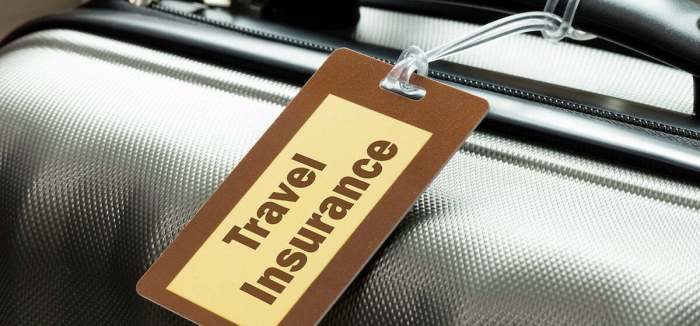
Understanding your travel insurance policy is crucial to ensuring a seamless and hassle-free travel experience. It Artikels the coverage provided, terms, and conditions, and exclusions. By carefully reviewing the policy, you can make informed decisions about your coverage and ensure that you’re adequately protected during your trip.
Reviewing Policy Details
Start by thoroughly reviewing the policy details, including the coverage limits, deductibles, and any additional benefits or riders included in your plan. Ensure you understand the specific circumstances under which coverage applies and any limitations or restrictions that may exist.
Understanding Terms and Conditions
Pay close attention to the terms and conditions of the policy. These sections Artikel the obligations and responsibilities of both the insurance company and the policyholder. Look for sections covering claims procedures, time limits for filing claims, and any exclusions or limitations that may apply.
Interpreting Complex Policy Language
Travel insurance policies can sometimes contain complex legal language. If you encounter any sections that you don’t understand, don’t hesitate to seek clarification from your insurance provider or an insurance professional. It’s essential to have a clear understanding of the policy’s provisions to avoid any misunderstandings or disputes in the event of a claim.
Filing a Claim

Travel insurance provides peace of mind and financial protection in case of unforeseen events during your trip. Filing a claim is essential to receive reimbursement for covered expenses or losses.
Here are the steps involved in filing a travel insurance claim:
Contacting Your Insurance Provider
Immediately notify your travel insurance provider about the incident or loss as soon as possible. You can usually do this by calling their customer service number, submitting an online claim form, or emailing them.
Gather Necessary Documentation
To support your claim, you will need to gather relevant documentation, including:
- A copy of your travel insurance policy
- Proof of the incident or loss (e.g., police report, medical records, receipts)
- Documentation of expenses incurred (e.g., receipts for medical bills, transportation costs, accommodation)
- Contact information for witnesses or other individuals involved
Submit Your Claim
Once you have gathered the necessary documentation, submit your claim to your insurance provider. This can be done online, by mail, or in person at their office.
Timeframe for Filing Claims
There is usually a specific timeframe within which you need to file your claim. This timeframe varies among insurance providers, so it’s important to check your policy for details.
Resolving Disputes
If your claim is denied or you disagree with the settlement offered, you can file an appeal with your insurance provider. The process for resolving disputes varies, so it’s important to contact your insurance provider for specific instructions.
Managing Travel Emergencies
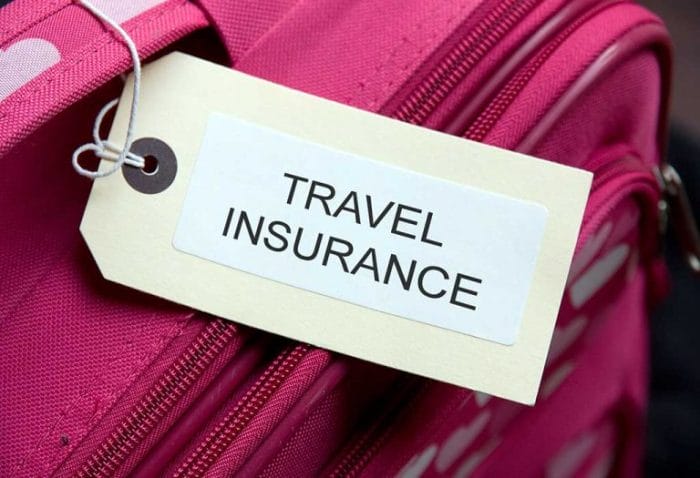
In the event of a travel emergency, having a list of emergency contacts and resources at your disposal can make all the difference. This includes the contact information for your travel insurance provider, the nearest U.S. embassy or consulate, and local emergency services.Travel
insurance plays a crucial role in assisting travelers with medical emergencies, lost luggage, or other unforeseen events. It can provide coverage for medical expenses, trip delays, lost or damaged baggage, and emergency evacuation. Having travel insurance can give you peace of mind knowing that you are protected in case of an emergency.To
minimize risks while traveling, it’s essential to stay informed about your destination, follow local laws and customs, and take necessary precautions to protect your health and belongings. Being aware of potential hazards, such as natural disasters, political unrest, or health risks, can help you make informed decisions and take appropriate measures to stay safe.
Emergency Contacts and Resources
Compile a list of important emergency contacts and resources before your trip, including:
- Your travel insurance provider’s 24/7 emergency assistance number.
- The contact information for the nearest U.S. embassy or consulate.
- Local emergency services, such as the police, fire department, and ambulance.
- Your doctor’s contact information.
- A list of your medications and any allergies you have.
Travel Insurance Coverage
Make sure you understand the coverage provided by your travel insurance policy. This may include:
- Medical expenses.
- Trip delays.
- Lost or damaged baggage.
- Emergency evacuation.
- Rental car damage.
- Accidental death and dismemberment.
Safety Tips
To stay safe while traveling, consider the following tips:
- Research your destination before you go. Be aware of potential hazards, such as natural disasters, political unrest, or health risks.
- Follow local laws and customs. Respect the culture and traditions of the places you visit.
- Take necessary precautions to protect your health. Get vaccinated, pack a first-aid kit, and drink plenty of water.
- Be aware of your surroundings and keep an eye on your belongings. Avoid walking alone at night or in isolated areas.
- Make copies of important documents, such as your passport, visa, and travel insurance policy. Keep them in a safe place separate from the originals.
Additional Considerations for High-Risk Travelers
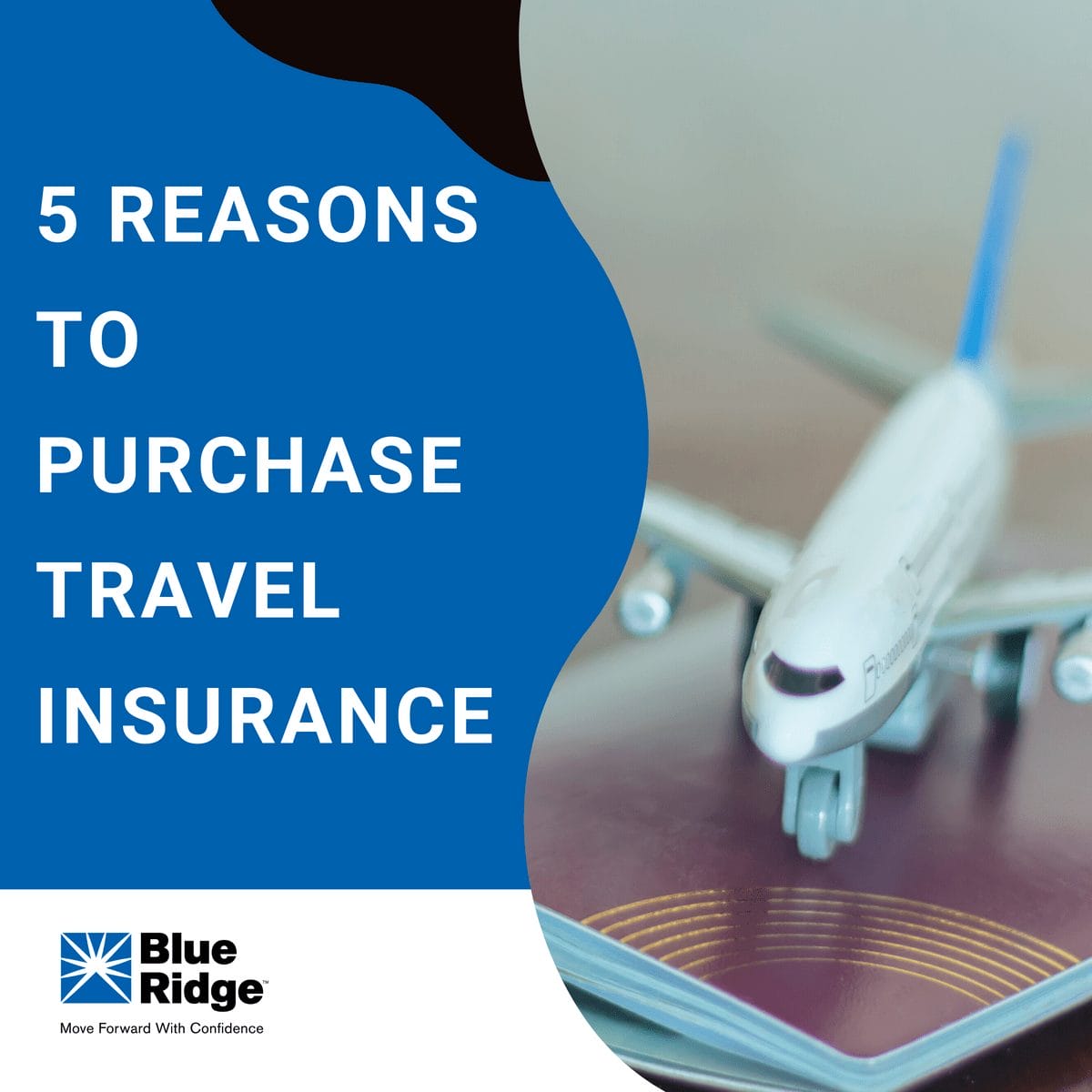
Travel insurance can provide peace of mind and financial protection for individuals with pre-existing medical conditions, seniors, and pregnant women. These individuals may face unique challenges and increased risks during their travels.
Understanding the specific needs and concerns of high-risk travelers is essential to ensure they have adequate coverage and support while away from home.
Additional Coverage Options
High-risk travelers may benefit from additional coverage options tailored to their specific needs. These may include:
- Pre-existing Medical Conditions Coverage: This coverage provides reimbursement for medical expenses related to pre-existing conditions that may flare up during the trip.
- Trip Cancellation/Interruption Coverage: This coverage reimburses travelers for non-refundable trip costs if they are forced to cancel or interrupt their trip due to a covered reason, such as a medical emergency.
- Emergency Medical Evacuation Coverage: This coverage provides for the cost of transporting the traveler to the nearest appropriate medical facility in case of a medical emergency.
- Baggage and Personal Effects Coverage: This coverage provides reimbursement for lost, stolen, or damaged baggage and personal belongings.
Managing Risks and Ensuring Adequate Protection
In addition to purchasing comprehensive travel insurance, high-risk travelers can take proactive steps to manage risks and ensure adequate protection:
- Consult a Healthcare Provider: Before traveling, consult a healthcare provider for a thorough checkup and discuss any specific concerns or precautions.
- Carry Medical Records: Keep copies of medical records and prescriptions in a carry-on bag for easy access in case of an emergency.
- Wear Medical Alert Jewelry: Consider wearing medical alert jewelry that clearly states any pre-existing medical conditions.
- Stay Informed: Keep up-to-date on travel advisories and warnings issued by government agencies and reputable travel organizations.
- Choose Accommodations Wisely: When selecting accommodations, consider factors such as accessibility, proximity to medical facilities, and availability of necessary amenities.
Travel Insurance and Peace of Mind
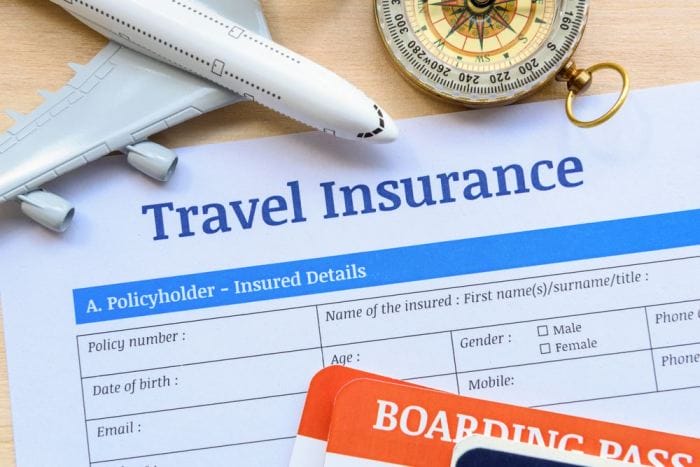
Travel insurance is not merely a financial safeguard; it’s an investment in peace of mind. With travel insurance, you can embark on your journey knowing you’re protected against unforeseen events that could disrupt your travel plans and cause financial distress.
Stories abound of travelers who faced unexpected situations during their trips. Medical emergencies, flight cancellations, lost luggage, and natural disasters can all lead to substantial expenses and inconvenience. Travel insurance provides a safety net, ensuring that you’re not left alone to deal with these challenges.
Benefits of Travel Insurance
- Financial Protection: Travel insurance can cover medical expenses, trip cancellation costs, lost or damaged luggage, and other unexpected expenses that may arise during your trip.
- Peace of Mind: Knowing you’re protected against unforeseen events can provide immense peace of mind, allowing you to focus on enjoying your trip without the added stress of worrying about potential risks.
- Enhanced Travel Experience: Travel insurance can enhance your overall travel experience by providing access to emergency assistance, medical care, and other services that can help you navigate unexpected situations.
Closing Summary
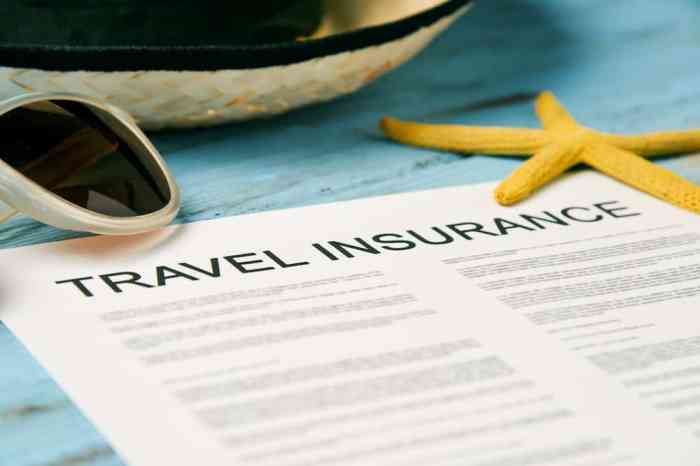
Remember, travel insurance is not just a safety net; it’s an investment in your peace of mind. By arming yourself with knowledge and making informed choices, you can embark on your journey with confidence, knowing that you’re protected against unforeseen events.
So, embrace the adventure, and let travel insurance be your steadfast companion, safeguarding your memories and ensuring a truly remarkable travel experience.
Common Queries
What are some common exclusions found in travel insurance policies?
Common exclusions may include pre-existing medical conditions, extreme sports, high-risk activities, and illegal activities. It’s essential to carefully review your policy to understand what’s covered and what’s not.
How can I assess travel risks and determine the appropriate level of insurance coverage?
Consider factors like the destination, political stability, crime rates, natural disaster risks, and your planned activities. Based on this assessment, you can choose a policy that provides adequate coverage for the identified risks.
What should I do if I need to file a travel insurance claim?
Contact your insurance provider immediately. Gather all relevant documentation, such as receipts, medical records, and police reports. Submit your claim promptly, following the instructions provided by your insurer.
What are some tips for managing travel emergencies?
Keep important documents and emergency contacts easily accessible. Familiarize yourself with local laws and customs. Stay informed about weather conditions and potential hazards. Be prepared with a first-aid kit and essential medications.



